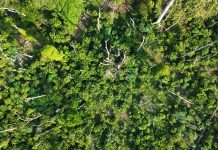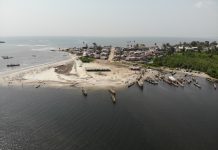Top: A swathe of palm plantation in Butaw, Sinoe County. The DayLight/Harry Browne
By Varney Kamara
MONROVIA – A team of Indonesians from communities affected by palm plantations has shared their experiences with actors in the Liberian oil palm industry, introducing a new monitoring tool that builds a relationship between villagers and investors.
Indonesia is the world’s largest producer of palm oil. The southeastern Asian nation has rapidly expanded its oil palm plantations in recent decades, accounting for 50 percent of global oil palm production.
With its vast experience in the industry, stakeholders in the Liberian palm are hoping to learn new lessons to improve governance in the country’s battered oil palm sector that has seen years of human rights violations and bad labor practices.
The Liberian oil palm sector has seen a horde of protests and court actions over the last decade. In May 2020, Golden Veroleum Liberia (GVL), the country’s largest oil palm company, illegally dismissed 433 employees, sparking outrage across communities in Liberia’s southeastern Sinoe County. In Grand Cape Mount County, on the country’s western frontiers, villagers across the Mano Palm Oil Plantation areas have been at loggerhead with the company over its failure to implement corporate social responsibilities.
“Liberia needs a chamber that will help to mitigate conflict and develop policies about sustainability and human rights,” said Adinko, a senior human rights lawyer who headed the team at the event in Congo Town. “You need a community business, NGO, finance, and partners to talk about how to make the palm oil industry better in your country.
“You need to increase the smallholders in Liberia. You need to have an inclusive business sector, build capacity and provide backup to join with the big economy in your country,” Adinko added.
The event marked the end of a weeklong training of civil society actors on community-based monitoring (CBM), an approach designed to ease tension between communities and oil palm investors.
CBM is expected to mitigate these challenges, tasking multinationals to demand companies abide by existing laws and policies governing the sector. It was organized by Social Entrepreneurs for Sustainable Development (SESDev) with funding from the Rights and Resources Institute (RRI), an international non-governmental organization working to ensure better forest reforms and a forest economy.
“We are now understanding how things have moved from bad to good between companies and communities in other countries,” said James Otto, a lead campaigner at Sustainable Development Institute (SDI). “We wanted to understand what tools and approaches they are using. That gave rise to this exchange.”
Dr. Michael Lartey, the general manager for the sustainability of Golden Veroleum Liberia (GVL), said the success of the program will hinge on the commitment of companies and communities alike.
“The expectation is that whatever we will come up with, whether by MoUs or other social agreements, they must be done through the free prior and informed consent (FPIC) process,” Lartey said.





Facebook Comments